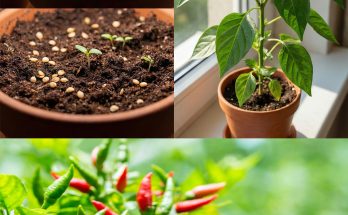If you’re struggling to get your lemon tree to produce fruit, this guide is here to help. Whether your lemon tree is in a pot or planted directly in the ground, the tips shared here will help you ensure your tree thrives and produces healthy fruit throughout the year.
Choosing the Right Location for Your Lemon Tree
First and foremost, it is essential to plant your lemon tree in the right location. A lemon tree needs full sun to thrive—ideally, it should receive at least 5 to 7 hours of direct sunlight every day. If your tree isn’t receiving enough sunlight, it may not produce fruit or could even drop the few fruits it manages to grow. Make sure your lemon tree is in a sunny spot to encourage growth and fruiting.
Pruning Your Lemon Tree
Another crucial aspect of lemon tree care is pruning. Regardless of whether your tree is in a pot or planted in the ground, regular pruning is essential. Proper pruning helps the tree develop stronger, healthier branches, which are better able to support fruit. It also helps maintain the shape of the tree, making it more aesthetically pleasing and functional for fruit-bearing.
Pruning not only encourages the growth of new branches but also helps the existing ones hold on to their fruits longer. Remove any dead or damaged branches, and trim back excessive growth to help the tree focus its energy on producing fruit.
Fertilizing Your Lemon Tree
Fertilizing your lemon tree correctly is the next step to achieving a healthy, fruitful tree. A proper fertilization plan ensures your tree has the nutrients it needs to grow strong and produce abundant fruit. Here’s a simple yet effective fertilization method you can use.
Ingredients for the Fertilizer Mix:
-
-
15 liters of well-composted cow manure (can also be substituted with horse manure or any other animal manure of your choice)
-
15 liters of well-composted chicken manure
-
2 kg of wood ash (collected from burned wood or charcoal)
-
Steps for Fertilization:
-
-
Begin by digging a small trench around the base of the tree. Make sure you’re not digging too deep, just enough to allow the fertilizer to be evenly distributed near the root system.
-
Mix the cow and chicken manure thoroughly in a large bucket. Add the wood ash to the mixture, ensuring that everything is well combined.
-
Spread the mixture evenly around the tree’s base, making sure to cover the root zone.
-
Water the tree thoroughly after applying the fertilizer mix. This helps the nutrients soak deep into the soil, allowing the tree’s roots to absorb them.
-
This fertilizer blend is rich in essential nutrients for your lemon tree:
-
-
The cow manure provides calcium, organic matter, and nitrogen, which support root development and overall growth.
- The chicken manure is particularly rich in nitrogen, which promotes lush green leaves.
- The wood ash helps balance the acidity of the soil, making it easier for the tree to absorb nutrients and helping improve soil conditions.
-
Reapply Fertilizer Regularly
For optimal results, repeat this fertilization process every three months. This will ensure that your tree remains healthy, receives the necessary nutrients, and produces a bounty of lemons.
Monitoring Growth and Fruit Production
Once you’ve fertilized your lemon tree, it’s essential to keep an eye on its growth. Within a few months, you should notice an improvement in the tree’s overall health. It will begin to produce more flowers, and eventually, the flowers will turn into fruit.
As the fruit grows, continue to monitor the tree. If it starts to show signs of disease or pest infestation, take action immediately to prevent damage to the fruit. Regular watering and occasional pruning will also help maintain the tree’s health.
Conclusion
A lemon tree requires the right conditions, regular pruning, and proper fertilization to thrive and produce fruit. By following these simple tips, including providing plenty of sunlight, performing regular pruning, and using a nutrient-rich fertilizer, your lemon tree will be on its way to producing fruit year-round. The key is patience and consistency—before you know it, you’ll have a healthy tree that produces a bountiful harvest of lemons.



